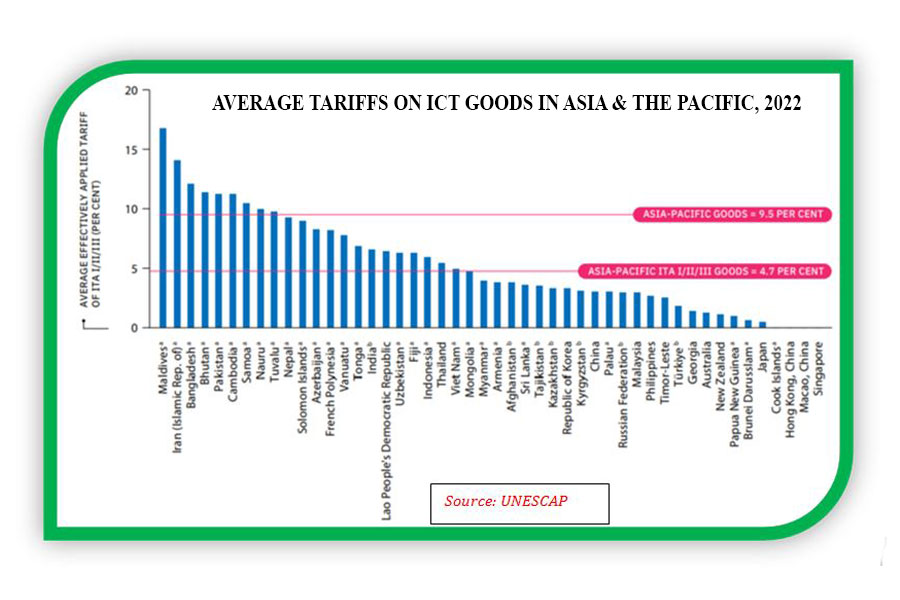Bangladesh imposes third highest tariff on ICT goods in Asia and the Pacific

Published :
Updated :

Bangladesh is one of the top countries in Asia and the Pacific region that imposes higher tariffs on information and communication technology (ICT) goods.
In 2022, the country’s average tariff on ICT goods was around 12 per cent. The rate was well above the region’s 4.70 per cent tariff on goods included in the Information Technology Agreement (ITA).
The latest report of United Nations Economic and Social Commission for Asia and the Pacific (ESCAP) unveiled the statistics. Titled as ‘Seizing the Opportunity: Digital Innovation for a Sustainable Future’, the report was released on Monday at the 80th session of ESCAP in Bangkok.

The report showed that on average Maldives imposed the highest rate of tariff on ICT goods, which was around 17 per cent in 2022, followed by Iran which imposed around 14 per cent tariff.
The average tariff on goods in the region was estimated at 9.50 per cent in the year under review.
“Digital trade in Asia and the Pacific can enable sustainable economic growth, but complex trade policy environments stop the region from reaching its full potential,” the report mentioned.
“While many economies have moved towards lowering tariffs on ICT goods, there remains significant heterogeneity across the region,” it added.
“The average regional tariff was 9.5 per cent in 2022, but tariffs on ICT goods range from 0 per cent in economies such as Singapore and Hong Kong, China, to more than 17 per cent in the Maldives,” it continued.
The ESCAP report also pointed out that in addition to tariffs, ICT goods and services frequently become targets of trade protective measures.
“Over 30 per cent of the surveyed economies implement anti-dumping measures, safeguards, and countervailing duties, with 27 per cent of them outrightly banning certain ICT goods or services, especially in South and South-West Asia,” it added.
The report also showed that more than half of the countries, including Bangladesh, of the region is not a member of the Information Technology Agreement (ITA), originally signed in 1996 to eliminate tariffs on a wide array of ICT products, including computers, telecommunications equipment, and semiconductors.
In 2015, participating countries collaboratively completed an expansion of the agreement as ITA II. It was implemented in 2016 and removed tariffs on an additional 201 ICT parts, components, and products. This expansion encompasses new IT products and technologies that have emerged since the original agreement in 1996.
Some countries like India joined the ITA I but still did not become a member of the ITA II.
The report also mentioned that as technologies continue to evolve and give rise to an ever expanding range of ICT products, a proposal made by the Information Technology and Innovation Foundation (ITIF) for ITA III expansion emerged.
“The proposal aims to broaden the scope of tariff elimination to include additional next-generation ICT products,” it added. “These categories include semiconductor manufacturing, energy-efficient technologies, medical devices and equipment, meters, electronics packaging and transport, flat panel displays, high-speed digital cameras, 3D printers, smartphones, drones and satellites, and industrial robots.”
Meanwhile, global and regional leaders called for a decisive plan to encourage further ingenuity and to tap into emerging technologies and digital innovation to bolster the big effort required to achieve the Sustainable Development Goals by 2030.
They made the call at the inaugural ceremony of the ESCAP’s 80th session on Monday morning in Bangkok, according to a press statement of the ESCAP.
“Intelligently deployed and properly governed digital solutions, based on a common understanding, shared approaches and collaborative governance, form the foundations for the collective push necessary for the attainment of the 2030 Agenda for Sustainable Development,” said Armida Salsiah Alisjahbana, UN Under-Secretary-General and Executive Secretary of ESCAP.
Asia and the Pacific is at the forefront of a global digital transformation. In the finance sector alone, the value of digital transactions is projected to reach $6.7 trillion by 2026.
ESCAP is an intergovernmental platform in the Asia-Pacific region. The Commission promotes cooperation among its 53 member States and 9 associate members in pursuit of solutions to sustainable development challenges. ESCAP is also one of the five regional commissions of the United Nations.


 For all latest news, follow The Financial Express Google News channel.
For all latest news, follow The Financial Express Google News channel.